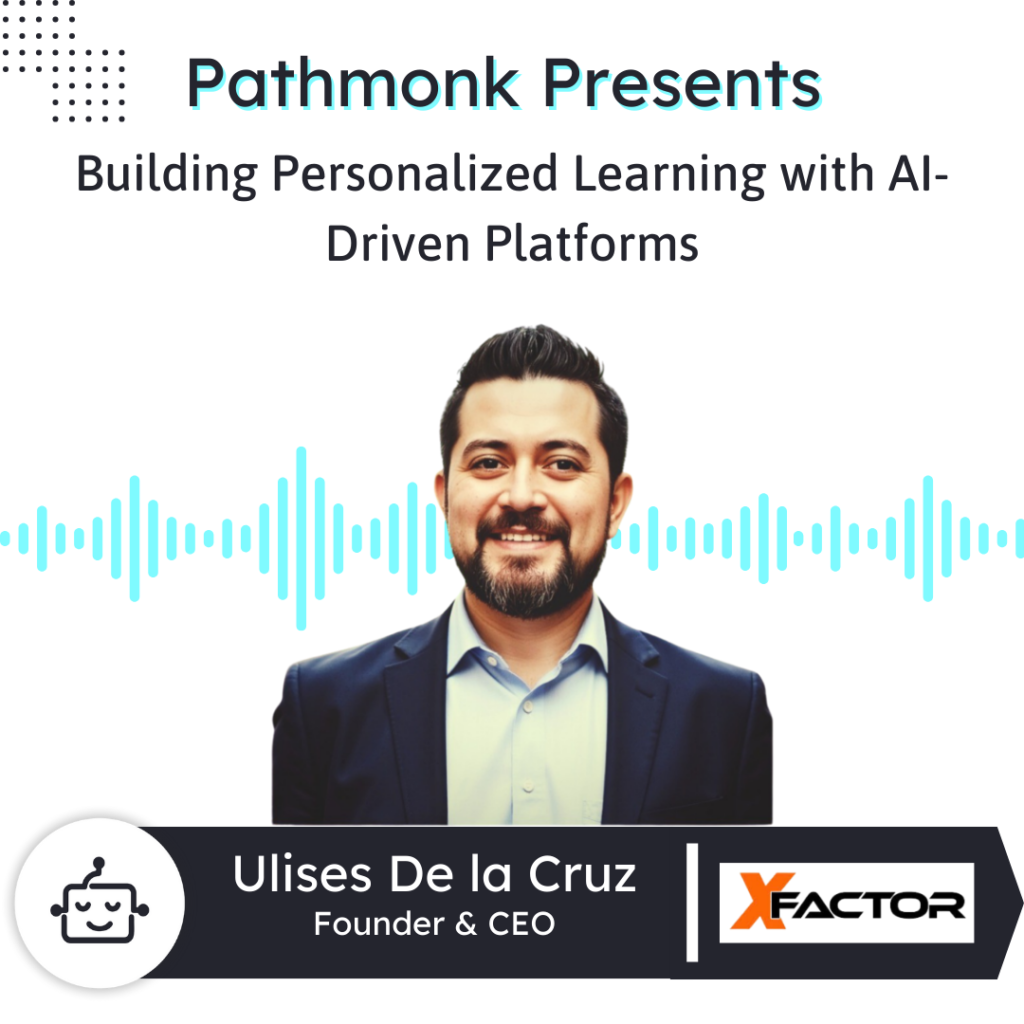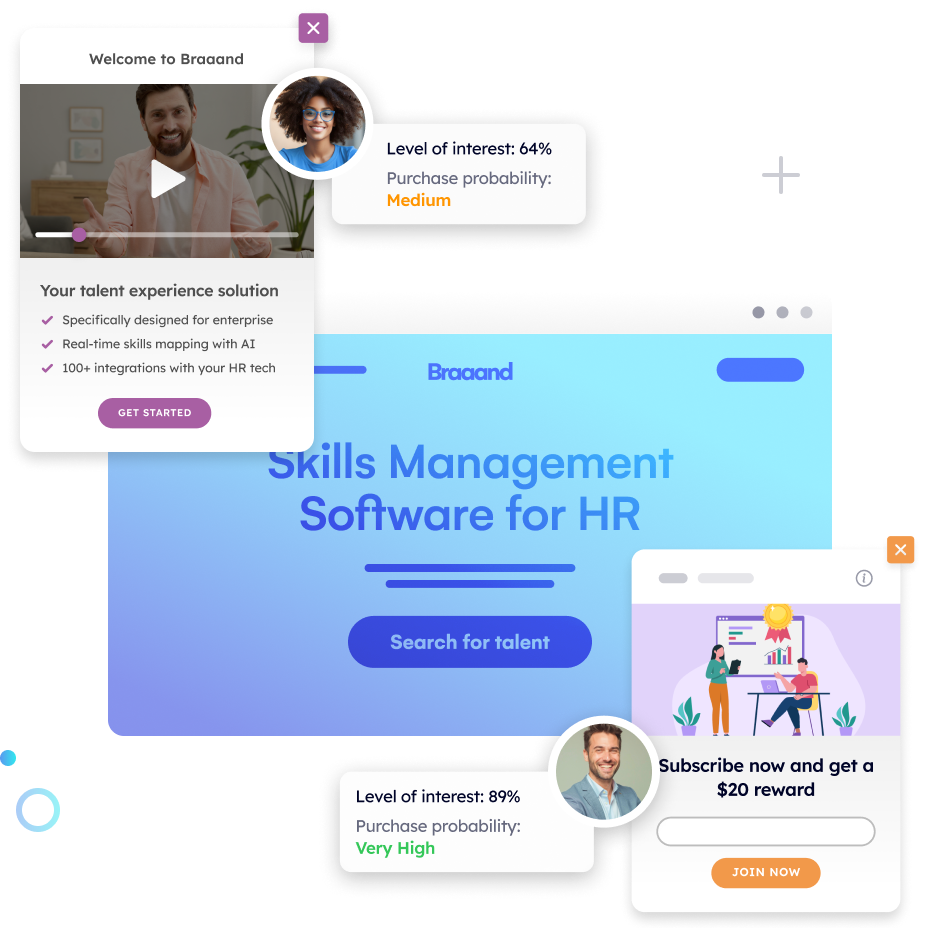
Introduction
In this episode of Pathmonk Presents, Kevin speaks with Ulises De la Cruz, founder of X Factor Academy, an AI-driven education platform providing hyper-personalized learning experiences.
Ulises shares how X Factor Academy combines immersive technology and real-time feedback to deliver tailored training for SMBs, entrepreneurs, and freelancers. He dives into the challenges of creating multilingual SEO strategies, the importance of early adopters in refining the product, and the value of competitor analysis.
Discover how this edtech startup is building a learning environment that adapts to users in real time, helping them grow faster in a rapidly evolving market.
Increase +180% conversions from your website with AI
Get more conversions from your existing traffic by delivering personalized experiences in real time.
- Adapt your website to each visitor’s intent automatically
- Increase conversions without redesigns or dev work
- Turn anonymous traffic into revenue at scale

Kevin Shirley: Hey everybody, welcome to the Pathmonk Presents podcast. Pathmonk is the AI for website conversions. With increasing online competition, over 98 percent of website visitors don’t convert. The ability to successfully show your value proposition and support visitors in their buying journey separates you from the competition online. PathMonk qualifies and converts leads on your website by figuring out where they are in the buying journey and influencing them in key decision moments with relevant micro experiences like case studies, intro videos, and much more. Stay relevant to your visitors and increase conversions by 50 percent by adding PathMonk to your website in seconds. Letting the artificial intelligence do all the work and increase conversions by 50 percent while you keep doing marketing as usual. Check us out on pathmonk.com.
Hey, everybody. Welcome back to the podcast today. We’re really excited to have a startup founder on the show today. We’ve got Ulises from X Factor Academy. Ulises, how are you today?
Ulises De La Cruz: Hi, Kevin. Thanks for having me. I’m very happy to talk to you.
Kevin: We’re really excited to have you, especially another person in the, let’s say, artificial intelligence space. We’re looking forward to talking a little bit about it. So, I know that we’ve already chatted a little bit off screen about X Factor Academy, but hopefully you can kind of open it up to our audience and tell us what it’s all about. Why don’t you give us a little background on X Factor?
Ulises: Yeah, sure thing. You know, Kevin, I got asked that question last week on the first week of the bootcamp, and I think my pitch really sucked because I went too technical, right? So I’m going to try to put it simply. Imagine this platform that adapts to you, grows with you, learns with you, and eventually validates your credentials. That’s X Factor Academy. We use AI-powered features and an immersive atmosphere so you can get hyper-personalized training and real-time feedback, guided by avatars in real time.
Kevin: And as an education technology venture, it seems like you guys are very much focused on the personalized learning process, is that right?
Ulises: Yeah, that’s correct. You know, when I was in commercial areas dealing with deals pretty much every day, I realized that different styles of selling work differently according to the person. So I started wondering if I should use different selling tactics for each of my buyer personas. That really took me into a path of hyper-personalization. That’s when I came up with the idea of creating something like this.
Kevin: Excellent. And speaking of your past in commercial areas and stuff like that, I’m curious—what sort of companies are you targeting? Who are the industries that you work within, and who do you think benefits most from a product like X Factor Academy at the moment?
Ulises: Well, according to our business model right now—because of course it can pivot, and that’s why I’m doing the bootcamp—we will provide solutions for high-growth SMBs, entrepreneurs, and freelancers. They’ll probably be the early adopters. But we’re also going to provide white-label options, so we’ll be working very closely with universities and other institutions.
Kevin: Okay. And within these early targets that you’re focusing on, are there any specific problems that you’re solving for them or what can they expect in terms of your offering?
Ulises: Yeah, you know, there’s a lot of content out there. I was leading all my way, prompting and prompting, just trying to create the best sales intelligence program. Then I found out there was a lot of content from social media, TikTok, blogs, and stuff. I really reflected on what the best program available in the world would look like. Companies have a big problem because most courses are static, outdated, and don’t get updated quickly, while the market evolves fast. We don’t depend on the human factor. We might be the first platform in the world with the ability to adapt in real-time based on user feedback. We’ll scale as fast—or even faster—than current industry trends.
Kevin: This is a really interesting space. I’d be curious to learn a little more about your competition and what you’ve seen so far in your research. But I want to focus a bit more on the growth and marketing behind it because we’re here to talk about that. Considering you’re a young startup trying to get your brand name out there, how are target customers discovering you for now?
Ulises: Right now, it’s via our waitlist that we just published a week ago. Another thing that’s helped a lot is collaborating with Next AI, which has given us a lot of social proof. So that’s been a big help. Our website represents our brand right now with the logo, animations, and content. It gives people a sense of who we are. We’re also keeping people updated through LinkedIn. We’ve decided to focus on just one channel at the beginning and will grow from there.
Kevin: And in terms of your online presence, what role do you think social media and your website will play in acquiring clients? Is it more about client education and brand awareness, or are you treating it as more of a conversion tool?
Ulises: It’s going to go with the clients and prospects along the entire sales and marketing funnel. It’s for the awareness stage, yes, but also for the middle and bottom of the funnel. Right now, people are finding us through the website, and we’re making a big effort in SEO. The website is in four languages—Spanish, English, Chinese, and French—and each language has its own SEO strategy. Within just one week, we had 300 organic visitors from 21 different countries. Based on feedback, we’ve already adapted our messaging for better clarity.
Kevin: That’s awesome. Starting early with SEO is smart because it takes time to see results. I know how much effort goes into translating SEO campaigns into multiple languages. Well done on that.
Ulises: Thank you. If I want to promote hyper-personalization, we have to go with the most personalized version of a website.
Kevin: That’s well put. If you’re promoting personalization, the website has to embody that. Let’s shift focus to you as a founder. What are some of the key tasks and priorities you focus on in day-to-day operations?
Ulises: Product development is key right now as we work toward the MVP. We have a lot of algorithm tasks and need to prioritize variables. Being part of Next AI has connected me with brilliant people who are helping with this. Engaging with early adopters and having conversations about refining our product is another big focus. Lastly, I’m engaging in early collaborations with chambers, B2B companies, and others.
Kevin: Excellent. Where do you go to stay informed and inspired about industry trends?
Ulises: I like the EdSurge newsletter and the MIT Technology Review. I also follow marketing podcasts, including one by a guy from England about marketing in AI. I keep an eye on competitors, learn from their blogs, and engage with thought leadership and industry groups.
Kevin: That’s great. Keeping an eye on competitors is essential. What they’re doing can teach you a lot. Let’s move into the rapid-fire round. Short, crisp answers only. Ready?
Ulises: Ready.
Kevin: What’s the last book, article, or resource you found valuable as a founder?
Ulises: Eric Ries’s The Lean Startup. I’d read it again.
Kevin: If there were no technological boundaries, what’s one challenge you’d solve for your startup today?
Ulises: I’d love to prompt an immersive virtual environment without needing to produce any code or algorithms.
Kevin: Are there repetitive or time-consuming tasks in your role you’d love to automate?
Ulises: Yes, outreach—especially on LinkedIn. I know about tools like Xpandi and Navigator, but I have to choose my tech stack carefully at this phase. I’d love to automate everything.
Kevin: Looking back, what’s one piece of advice you’d give yourself if you were starting this journey again?
Ulises: This business is about learning faster. That’s the game—if you can learn faster, you’re two steps ahead.
Kevin: Wise words. Thank you, Ulises, for joining the show today. For anyone looking for next-generation educational technology, check out X Factor Academy. Ulises, thanks so much, and I look forward to reconnecting in the future.
Ulises: Thank you, Kevin. It was my pleasure. Have a nice day.
Kevin: You too. Bye!



